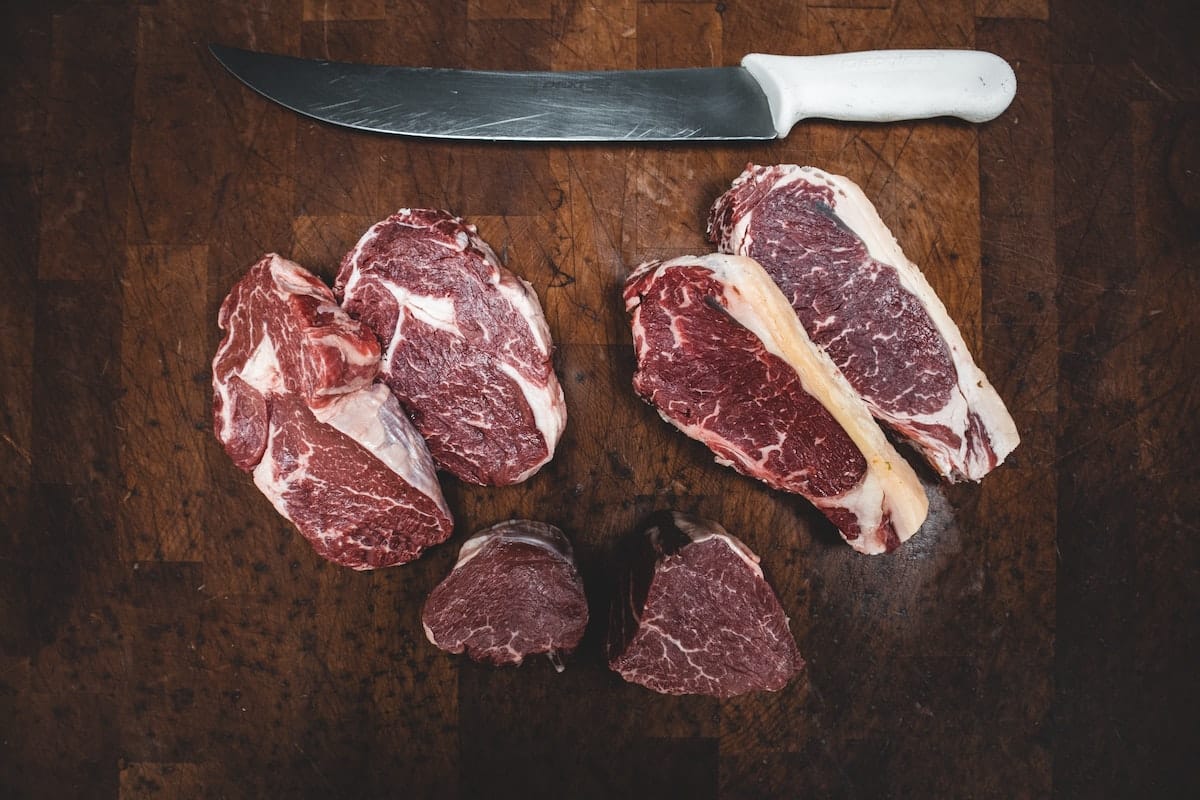Table of Contents
Wondering if it is healthy to follow a diet plan consisting of only meat, seafood, and eggs? If you want to give this unique diet a shot, the carnivore diet plan is for you. This diet plan is high on protein and low on carbs. Thankfully, there are many fantastic carnivore diet recipes that will help you find a balance between flavor and fitness.
But, you should not dive into following this diet before knowing everything about it. Every diet plan has its benefits and drawbacks. We will discuss the carnivore diet plan in this article and let you decide if it will suit you or not. So, let’s start with the basics!
What Is The Carnivore Diet?
In simple terms, a diet consisting solely of meat, salt, seafood, animal fats, poultry, and dairy is called a carnivore diet. Low-carb mainstays like almonds, avocados, and low-carb vegetables are strictly prohibited.
The carnivore diet excludes all plant items. It is a high-protein Keto diet with lots of protein and fat and very few carbohydrates.
This diet focuses primarily on meat. Many carnivores solely eat meat and even avoid dairy and eggs for their digestive health. Read the next section to learn more about the foods you can include in your carnivore diet plan.
What Foods Are Included In The Carnivore Diet?
The carnivore diet is essentially a meat feast with a daily carb goal of zero. Therefore, you only consume low-lactose milk, offal, fish, eggs, and other meat products.
Since your body uses fat as its primary energy source when following a carnivore diet, red meats, particularly fatty steaks like ribeye, are considered the best option. You can include the following foods in this diet:
- Meat: Turkey, pork, beef, chicken, etc.
- Fishes: Salmon, herring, sardines, etc.
- Other Animal Meats: Lobster, crabs, oysters, etc.
The only exceptions in the carnivore diet are coffee and tea. Even though they are produced from plants, some carnivore dieters keep them in their diet.
What To Avoid Eating On The Carnivore Diet?
This diet plan is a strict exclusion diet that comes close to zero-carb. In addition, it eliminates all non-animal and plant-based products.
Foods that are prohibited include:
- Vegetables
- Fruits
- Nuts
- Legumes
- Sauces
So, why would anyone want to follow this strange restrictive diet? Find out in the next section.
Benefits Of The Carnivore Diet
There is no credible study that has been done on diets consisting solely of meat or animal products because the carnivore diet has gained popularity only recently. However, we can use the most recent research on various diets and eating patterns to figure out why becoming a strict carnivore has garnered such positive reviews:
Reduced Signs Of Indigestion
Most fruits, vegetables, and cereals contain fiber, which does not break down during digestion. Instead, it adds volume to the stool by drawing in water. Unfortunately, some microbes in your stomach break down fiber, which results in bloating, inflammation, and other symptoms of indigestion. According to one study, some people with digestive problems (like constipation) may benefit from cutting back on or eliminating fiber.
Increase In Testosterone
As men age, their testosterone levels naturally start to decline. Dieters who eat meat claim that doing so prevents their testosterone levels from dropping.
One study looked at how testosterone levels were affected by a high low-carbohydrate, high-fat diet. Although the subjects were only observed for roughly three months, it demonstrated that the young males who followed this eating plan experienced a surge in testosterone levels.
Weight Loss
Any eating routine that reduces caloric intake can help you lose weight. In addition, the carnivore diet’s constrained menu options may make it simpler to control your appetite.
The carnivore diet focuses on consuming more fat and protein. Both of these nutrients make you feel full for an extended time and curb overeating, which may result in weight loss. On the other hand, dieters who stick to an all-meat diet say it is easier to cut out needless nibbling and only eat whenever they are hungry.
As amazing as the carnivore diet sounds for its health benefits, it does have its fair share of drawbacks. Learn more about them in the next section.
Risks And Concerns Of The Carnivore Diet
The carnivore diet has quite a few drawbacks because it is so severely restrictive. Also, there are a few risks of following this diet for an extended period:
May Result In Nutritional Deficits
Although meat is nourishing and offers a variety of micronutrients, it does not meet all of our needs for vitamins and minerals. These four nutrients are tough to obtain in significant amounts on a meat-only diet:
- Calcium: Needed for healthy bones, muscles, and nerves.
- Vitamin C: Needed for collagen formation and enhancing immune cell activity.
- Vitamin E: Needed for preventing LDL particles from oxidizing and causing atherosclerosis.
- Vitamin K2: Needed for controlling blood vessel stiffening.
Does Not Offer Enough Fiber
Fiber (a non-digestible carb) helps to maintain gut health, nourishes your microbiome, and encourages regular bowel movements. However, fiber is only present in plant-based foods. A low-fiber fiber diet can result in gastrointestinal problems like diarrhea, constipation, and a higher risk of colon cancer. Although there have not been many studies done on how a carnivore diet impacts gut health, the available data points to the benefits of including fiber in your meals.
Not Appropriate For Some Groups
A few populations may only suffer adverse effects from following the carnivore diet. These include:
- Individuals with chronic kidney disease.
- Familial hypercholesterolemia patients.
- Any person with specific nutritional needs that rely on plant-based foods.
The Bottom Line
The carnivore diet, which only allows meat, seafood, eggs, and a very minimal amount of low-lactose dairy, is exceedingly restricted. There is no evidence to support the claims that it helps with weight loss or various health conditions. Additionally, it is rich in fat and salt and devoid of fiber and plant-based ingredients, making it difficult to sustain over a long period of time. Thus, it is better to follow a balanced diet of meats, vegetables, fruits, and cereals to boost your health.

Author Bio
Nisha has a great passion towards writing and loves the idea of sharing. She has written many articles on yoga, fitness, wellness, remedies, and beauty. She keeps reading articles on different blogs that gives a kick to her passion and provides her with different ideas. She is growing day by day and mastering herself in writing appealing articles. She is a regular contributor to StyleCraze.com & Other few websites too.


